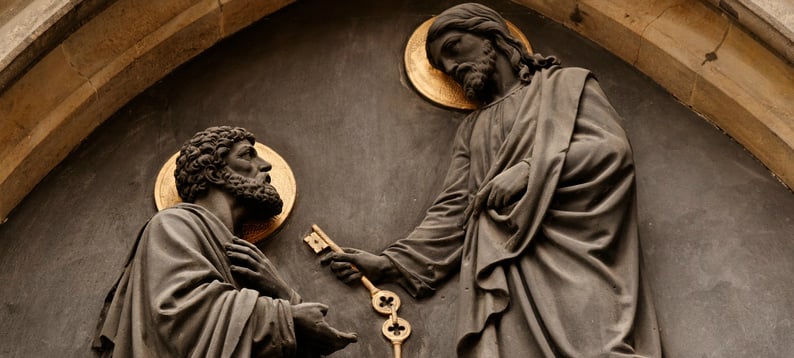XXI SUNDAY IN ORDINARY TIME - Matthew 16:13-20
Whenever we speak of God, we fall short of words. It is nearly impossible to speak of the divine with human words. In Bemba, there is a proverb that says: Apasamika umutali, umwipi teti afikepo. It is impossible for the short one to reach up there where the tall one keeps things. In his letter to the Romans, Paul tells us exactly that: “how impossible to penetrate his motives or understand his methods! Who could ever know the mind of the Lord? Who could ever be his counsellor?” (Ro 11:33-34).
In our theological discourse, we must remain aware of the limits of our language. God is always somehow (or even greatly) different from what we say. Before God, we are faced with the mystery, an overwhelming mystery that surrounds and penetrates us to the inner core of ourselves. With Paul, we can cry out: “How rich are the depths of God – how deep his wisdom and knowledge!” (Ro 5:33). To know God and to know his design and plan for us is only possible if he reveals himself to us. We are in a constant search for meaning and for truth - in a search for God and we are baffled by our inability to make headways. In our intellectual search for God, we are only able to get a glimpse of him. Revealing himself to us in Jesus Christ, God presents us with the offer of a relationship of love. It is only through love - first of all, a love received and then a love given back - that we may enter the heart of God and discover his loving plan of salvation for us.
Before God’s love, we must sing his praises with Paul: “To him be glory for ever! Amen.” (Ro 11:36). And we must make ours the words of the Psalmist:
“I thank you for your faithfulness and love,
which excel all we ever knew of you.
On the day I called, you answered;
you increased the strength of my soul.” (Ps 138:2-3)
Due to his love, God has decided to “reconcile the world to himself” in Christ “and he has entrusted to us the news that they are reconciled.” (2 Co 5:19). It is in Jesus, who is the Christ, the Son of the living God, that we are reconciled with God, being accepted as his beloved children.
Today’s gospel presents the big question that we should always ask about Jesus of Nazareth: Who is Jesus? Who is he for me, for us? In the end, Jesus himself asks that question from us. We may have encountered Jesus in many different ways and have different ideas about him. However, if we look for him with a sincere heart, sooner or later we will come to the community of his disciples - the Church - and make with them the proclamation first made by Peter: “You are the Christ, the Son of the living God.” (Mt 16:16). This is the faith of the Church, and there is no Church without believing with the full assent of our hearts and minds that Jesus is the Christ, the Son of God. This is the foundation of the Church, the rock upon which Jesus builds his Church.
And in Peter, Jesus entrusted to the Church the ministry of reconciliation. This ministry implies to proclaim the good news of God’s mercy in Jesus Christ, that is the good news that we are reconciled in Jesus Christ, and the mission to lead people to reconciliation. working for reconciliation, we work for the Kingdom of God, received as a gift with a thankful heart.








